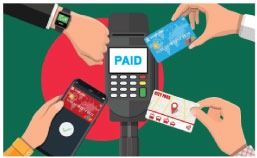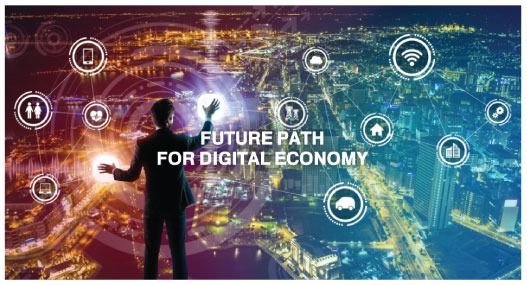![]() Admin
Admin
![]() September 27, 2025
September 27, 2025
![]() (0) Comment
(0) Comment

![]() Admin
Admin
![]() September 27, 2025
September 27, 2025
![]() (0) Comment
(0) Comment
Rapid growth of digital platforms is transforming our economic and social lives. Access to high speed internet connection and growing usage of digital applications, tools and communication technologies is leading to a range of improved business outcomes, such as productivity gains, cost savings and new revenue streams. Increased availability of smartphones is reshaping consumer experience, financial transaction, social interaction, and leisure and entertainment.
A broad range of economic activities which utilize digitized information and knowledge as the key factor of production, information and communication networks as an important activity space, aiming for effective service delivery, productivity growth and business process optimization is, taken as a whole, termed as the digital economy. Organisations, people and machines interconnected with the Internet, Internet of Things (IoT) and mobile technologies is the foundation of digital economy.
 In a digital economy, companies use digital data to create their business models. Numerous sectors at present depend on, or are significantly enhanced by digital technologies and digital inputs for production and service delivery such as telecommunications, banking, insurance, tourism, agriculture, trading, health, education, and others. Digital services, products, and solutions are enhancing efficiencies, increasing productivity, generating insights through data analytics, expanding access to information and knowledge and facilitating communication across the globe.
In a digital economy, companies use digital data to create their business models. Numerous sectors at present depend on, or are significantly enhanced by digital technologies and digital inputs for production and service delivery such as telecommunications, banking, insurance, tourism, agriculture, trading, health, education, and others. Digital services, products, and solutions are enhancing efficiencies, increasing productivity, generating insights through data analytics, expanding access to information and knowledge and facilitating communication across the globe.
Digital economy is not merely an avenue for generating more profits; it is the highway toward more efficient growth and inclusive prosperity. The most visible components of digital economy are:
1. ICT equipment, semiconductors industry;
2. Telecommunication and Internet services;
3. Data processing, software and other information services;
4. Online platforms, including e-commerce platforms;
5. Platform-enabled services (e.g. ride sharing, etc.).
Digital economy has the potential to grow and flourish when certain basic factors are in place. The first and foremost requirement is reliable high-speed robust digital infrastructure. Other important factors include digitally competent and engaged companies as well as digitally willing and competent employees, consumers and citizens. An inclusive digital ecosystem where no one is digitally excluded is the touchstone of success in the digital world.

Digital Infrastructure
High-speed, reliable and robust digital infrastructure is the key to digital economy. Digital infrastructure consists of connectivity through high-speed internet and related technologies, loT such as mobile devices, appliances, computers, sensors, geospatial instruments, machine to machine communications, etc. and data repositories such as data centers and cloud technology. Digital infrastructure provides the channel for people, businesses and governments to access online local and global digital services and connect them to the global digital economy.
Growing reliance on connectivity in the developing world is transforming economies, societies, governance, and interpersonal relationships. Digital transformation was accelerated due to necessity during the COVID-19 pandemic when people, businesses, schools and governments had to rapidly adopt digital channels amid lockdowns, and social distancing guidelines.
In Bangladesh, growing demand for digital devices, connectivity and consumer gadgets among the emerging middle class have created a favorable environment for the growth of digital economy. Bridging the digital divide is crucial for developing an inclusive society in which digital economy can thrive.

Digital Inclusion
Globally, digital inclusion has become a top policy priority. In 2023, the G20 Leaders' Summit in New Delhi put emphasis on digital inclusion. Additionally, the UN Economic and Social Commission for Asia and the Pacific (UN ESCAP) highlighted the importance of digital inclusion and cooperation in its 2023 Annual Report.
The mobile telecommunication technology thrives as the vital organ of the digital ecosystem. Key transformative power of mobile technologies lies in their role as the enabler of digital economy. According to the Association of Mobile Telecom Operators of Bangladesh (AMTOB), more than 98% of the population in Bangladesh is covered with high-speed 4G network. The Mobile Network Operators (MNOS) are playing a positively supportive role to bridge the digital divide by providing fast and reliable connectivity, particularly in rural areas where other options are limited. The MNOS have invested heavily in their infrastructure with capital expenditure (capex), set to increase mobile broadband network deployments.
A vast number of literature show evidence regarding the enhancing effects of ICT adoption on growth and development. Researchers have shown that a 10 percent increase in mobile broadband networks adoption causes a 0.14 percent increase in GDP for non-OECD countries. And a 1 percent increase in mobile phone penetration leads to a 0.12 percent increase in human development index in South Asia.
The benefit consumers receive from mobile technologies is usually quantified by using an economic concept called consumer surplus, i.e., the value that consumers themselves receive, over and above what they pay for devices, apps, services and Internet access.
According to data from Bangladesh Telecommunication Regulatory Commission (BTRC), over 90% of the total internet subscribers in Bangladesh use mobile internet. The MNOS are now the digital service providers offering numerous digital services to diverse segments of customers. For the 117.47 million mobile internet subscribers, the MNOS are offering diverse digital services such as e-education, e-health, e-commerce, e-entertainment.
However, certain barriers for access to the digital economy and digital government services still exist. More than 50% of the population in Bangladesh covered by mobile internet networks still do not subscribe to internet services. Affordability of digital devices and data as well as lack of digital literacy are core reasons for such shortfall in digital inclusion.

Financial Inclusion
Mobile Financial Services (MFS) have successfully brought a substantial number of previously unbanked poor populations into the formal banking system.
MFS operators are supporting financial inclusion boosting the growth of digital economy in Bangladesh. Disbursement of government financial support under social safety net programmes and stimulus packages through MFS have broadened the range of including more unbanked people into the formal financial system.
Currently, 10 banks and 3 subsidiary companies in Bangladesh are providing MFS as an alternative payment channel. Among the more popular MFS providers are bKash, Rocket, Nagad and others. Initially confined to money transfers, the landscape of MFS has been changing with providers introducing digital credit and money-saving features through mobile applications, boosting a broader and more sophisticated financial ecosystem. The share of money transfers stood at 86% out of all transactions in 2022, whereas merchant payments, salary disbursements, government cash transfers to people, utility bill payments, talk-time purchases, and other usages accounted for more than 10% of all transactions.
 bKash has been a leader in introducing innovative digital financial services in Bangladesh. bKash offers various bill payment services, including utility bills, internet bills, and mobile phone recharges. bKash has expanded its services to enable users to make payments at various merchants, allowing for cashless transactions at shops, restaurants, and other retail outlets.
bKash has been a leader in introducing innovative digital financial services in Bangladesh. bKash offers various bill payment services, including utility bills, internet bills, and mobile phone recharges. bKash has expanded its services to enable users to make payments at various merchants, allowing for cashless transactions at shops, restaurants, and other retail outlets.
bKash has collaborated with international partners to facilitate cross-border remittances, providing a streamlined and cost-effective way for Bangladeshi expatriates to send money home. bKash pioneered digital nano loans and savings accounts through MFS, promoting financial inclusion and allowing users to access credit and savings services. bKash also introduced utility bill payment, ticket payment, government services and educational fee payment, insurance premium payment, government-to-person payment, salary disbursement of RMG and other organizations.
For boosting up this present momentum to build a robust digital economy, it is crucial to bring the Micro, Small, and Medium Enterprises (MSMEs) within the fold of the digital ecosystem. Integrating the MSMEs to utilize the convenience and harness the competitive advantage of digital transaction will accelerate our move towards building a cashless society.
rowth potentials of MFS in Bangladesh remain as yet to be fully tapped. Mobile financial transactions are still dominated by point-to-point (through agents) and person-to-person (P2P) transactions. Payment for vast majority of e-commerce orders is still done on basis of cash on delivery (COD). MFS operators need to come up with offers that are easy to use and inexpensive in terms of transaction costs to encourage more and more customers to switch to digital payments and transactions.
MFS is boosting economic growth and supporting the expansion of the digital economy. MFS providers need to work with financiers (Banks, NBFIs, and MFIs) to provide loans, insurance services, and innovative savings scheme; of which some pilot initiatives have already been implemented and are known to have generated mostly promising results. Inward remittance flow through MFS is a highly potential segment for Bangladesh.

IT Industry in Bangladesh
IT industry in Bangladesh has seen significant growth in the last decade, driven by such factors as increased internet penetration, growing pool of skilled IT professionals as well as initiatives on behalf of government. According to the Bangladesh Association of Software and Information Services (BASIS), the software and IT services industry has been growing steadily, with annual revenue reaching around $1 billion by 2020. According to the Export Promotion Bureau (EPB), earnings of domestic IT firms stood at $221.15 million in July-November of 2023-24.
IT industry in Bangladesh comprises software development and IT-enabled service (ITES) including business process outsourcing (BPO) service, which have high potential for exports. According to Bangladesh Association of Software and Information Services (BASIS), export earnings from software and IT services reached around $1 billion USD in the fiscal year 2020-2021. To gain competitive edge in the global market, IT firms in Bangladesh need to go for partnership with international partners for the sake of brand building and reduction of production costs through economies of scale.

Unlocking the Growth Potentials
Domestic e-commerce and f-commerce has been rising fast in Bangladesh in recent years, particularly since after lockdown during COVID-19 pandemic. According to the e-Commerce Association of Bangladesh, e-commerce sales increased by 70 percent in 2020 compared to a year earlier. The e-commerce retail sector is a significant source of foreign investment, which reportedly raised approximately $41 million dollars in 2020.
In 2016 Malaysia became the first country in the world to establish a Digital Free Trade Zone (DFTZ) to promote e-commerce by providing a state-of-the-art platform for small and medium enterprises (SMEs) and others. Jack Ma, CEO of Alibaba, the largest e-commerce company in the world is reported to have committed major investments to the DFTZ.
India has successfully made technical advancements in diverse digital economy sectors such as Internet marketing services, e-learning initiatives, online banking capabilities, digitisation of the bus and rail systems, etc. Digitalisation is to boost Indian Railways to adopt many of the features planned for the Future Railway Mobile Communication System (FRMCS). GPS tracking, live bus locations, and mobile alerts have enhanced the convenience and safety of bus travel. Operators also benefit from technology in terms of fleet management, curbing speeding, and managing route deviations.
The Industry Development program (IDP) of Sri Lanka has been put forward with foresight. and designed localized projects to align Sri Lanka's tech ecosystem with global trends targeting to reach $3 Bn of annual foreign exchange revenue generated via knowledge services sector and electronics sector.

Future Path for Digital Economy
Cutting-edge innovations led by advanced digital technologies have emerged as one of the key drivers of business growth, economic development and lifestyle improvements. People, organisations and machines interconnected with the Internet, Internet of Things (IoT) and mobile technologies is reshaping business processes, governance procedures, workplaces, markets, payments and transactions, consumer experience, social interactions and entertainment.
Digital economy is creating income-earning opportunities, creating jobs, and facilitating delivery of public services. To boost growth in digital economy it is crucial for Bangladesh to take up viable strategic approach. There is an urgent need to enhance skills of our workforce, including technical skills as well as understanding of international market dynamics, intellectual property rights, and global trade regulations.
Education, IT Outsourcing, Digital Media, Telecommunication, and emerging (4IR) Technologies are the present and future categories of digital economy in Bangladesh. As Bangladesh strides towards knowledge economy, large scale investment is requisite for deployment and development of technologies such as 5G, Al, IoT, machine learning, Big Data, etc. for various manufacturing and service industries.
It is imperative for Bangladesh to invest in digital infrastructures, research and development (R&D) for innovative solutions, services and products, and creative ingenuity of the young generations to create machine-ready human resource proficient in 4IR technologies, to fully explore and harness the transformative powers of digital economy for transition to knowledge economy.